After the earthquake: Nepal's forgotten village
- Published
As Richard Galpin reports, people in some devastated communities are angry with the government response
There is little left in Deupur Sipaghat Kavre other than mounds of splintered wood and shattered bricks.
This one-street market town, sitting on the border of the Kavre and Sindhupalchok districts towards the border with Tibet, was packed full of Saturday shoppers when the quake hit.
Now it is quiet. Birds sing, villagers try to move rubble with their hands and, overhead, the hum of high-flying aid helicopters punctuates the air.
"They are flying in the sky, but no-one has come up to now," says Prakash Bhandari, who works as a waiter in Kathmandu but returned to see if he could help his home village.
"We are suffering. What to do?" he asks.
Despite having one of the largest casualty figures from Saturday's earthquake, this area has received little or no aid.
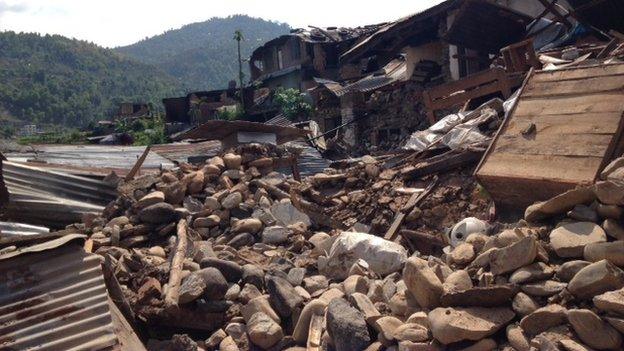
The village of Deupur Sipaghat Kavre has been devastated by the earthquake but has received almost no help
Villagers say they need tents and food, and that they are worried about disease.
They dug up the bodies of the people they knew with their bare hands.
But Saturday was a busy shopping day and they think that there are many more people under the rubble that they do not know.
Last rites
"We will die if there's no help from the government and other organisations," says Dhan Bahadur Shresthra who used to run the local pharmacy and was helping patients when the quake struck.
"I worked as a medic in the army for 25 years so I know that if we don't have clean water or food to eat, then there could be an epidemic," he says.
Further up the hill, villagers have taken matters into their own hands.
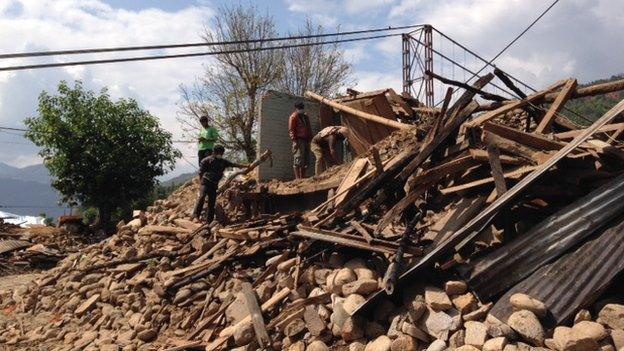
Some of the villagers have hired an excavator to help them clear the rubble and search for the dead
In a hamlet that is now nothing more than mounds of red earth and wood, 22-year-old Anjali Majhi has hired an excavator to search for the body of her two-year-old daughter.
Just before the quake hit, Ms Majhi had shouted at her daughter for bothering her and had sent her off to play with neighbours.
Now she says she will not rest until she can give her a proper funeral.
"We've found all the adults who died here and we've given them the last rites. I hope I can do the same for my daughter, otherwise I'll never forgive myself," she says.
But Ms Majhi is not sure whether she will find her child. The owner of the excavator did not charge her to hire it, but he did make her pay for the fuel.
It is running out now and she cannot afford to buy another tank.
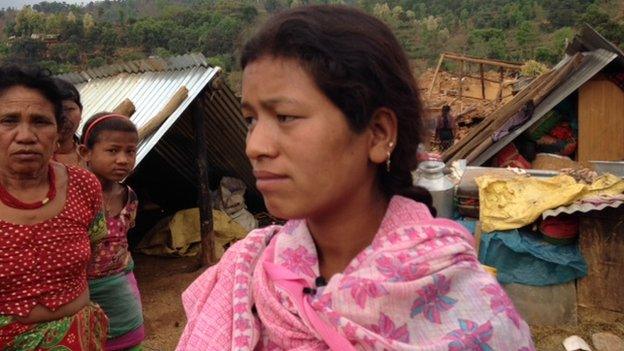
Anjali Majhi is searching for her daughter but can no longer afford to buy the fuel for the excavator
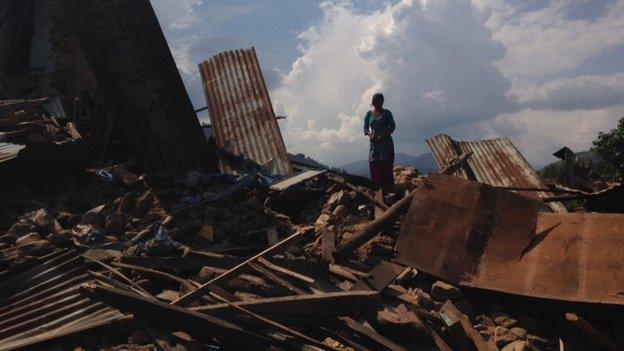
That excavator is the only help this village has had since the earthquake
A few hundred metres away, across terraces of corn, men who have shaved their heads in mourning carry two bodies, shrouded in white, down to the river for cremation.
These were found earlier in the day after another group of villagers hired the excavator for a few hours.
It is the only help this area has seen since the quake ripped their lives apart.
'Corrupt government'
Then, out of nowhere, a bus arrives carrying dozens of Nepali volunteers.
They are followers of the self-styled guru Master Godangel who stands at the roadside in robes of white and garlands of flowers and promises to help with food and shelter.
"I feel really upset about this government, I feel really, really upset," he says.
"It's a corrupt government. I'm not blaming them, but the way that they work is really very traumatic, very sad.
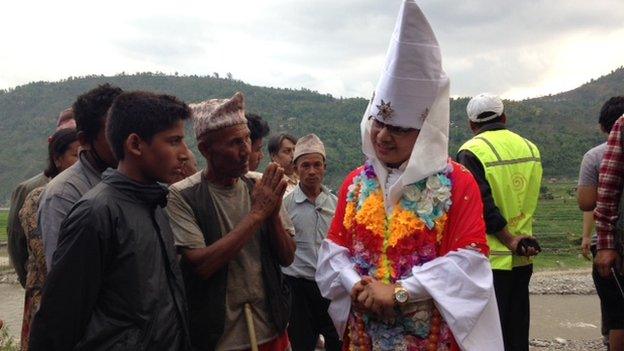
Some volunteers have now arrived in the village but they are all followers of self-styled guru Master Godangel
"They've received billions of dollars in international aid, but they're not doing anything."
Back up the hill, the fuel tank of the excavator is almost empty so its driver finishes for the day.
As the rain starts to fall, the only place that Ms Majhi can take shelter is with her animals.
"We still have hope," she says.
"Helicopters are flying overhead. We can't see who's in them but they can see us, so they might come and help."
